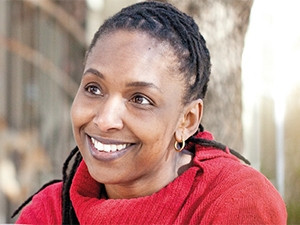
The first thing I ask Geci Karuri-Sebina when we meet for an interview is to explain exactly what she does in layman's terms. Her CV spans several pages and lists numerous reports published and projects completed involving urban governance, development planning, futures study and technology for development, but what does all that actually mean?
Karuri-Sebina unleashes a big, uninhibited laugh. "I used to come up with different terms whenever people asked me what I actually do," she jokes. "I'd say I'm an integrationist, an idealist. I didn't grow up wanting to be something that nobody understands! But I've always wanted to be in development and make things better and make places and people's lives better, and to work in an institution that can make changes happen."
Her laugh is something I'll see a lot of during the next hour, reinforced by jokes and anecdotes that make this vivacious, friendly woman feel like a friend you just hadn't met yet. She's also one of the fastest talkers imaginable, confident in her field and in her skin, even relishing a few grey hairs that are beginning to emerge. "The grey hairs help - people have to listen to me now because grey hairs show you know what you're talking about," she jokes.
Forty-one-year-old Karuri-Sebina is an executive manager at South African Cities Network, a body that works to coordinate all the municipalities in their efforts towards the future development of our cities. She ensures that people in each municipality talk to their peers across the country, so water management experts, urban safety experts, city planners, transport, human settlements, energy and waste management experts all exchange ideas and jointly debate any challenges they may face.
Her work involves the IT industry with regard to smart cities, including the use of technologies to improve how our cities function. But she takes a wary attitude to technology vendors, warning that IT is no panacea when so much else must be operating correctly first.
A dumping ground
"It's not just a technology question. I have a technology background and I believe IT will solve many things, but one has to be tactical and think about what technology might or might not do," she says. "We risk being a dumping ground for everybody's latest ideas and it's becoming very vendorled, but it should be driven by what the city wants to achieve and how innovation can help achieve that. Cities need to think about what they want before someone tries to sell them something," she says.
A lot of smart city conversations are about technologies like sensors, big data systems, cloud computing and the ways they can make a city better. That includes smart water and electricity meters that warn you before you get cut off, better traffic lights and improved urban safety with street cameras linked to emergency response centres. "We could be doing a lot if we used technology more cleverly to make our cities more efficient and make city life better," she says.
But most African cities require more effective management systems before they require new IT, she believes. "You have to have the basics in place before technology will solve everything. It's no good installing hi-tech CCTV cameras if nobody is watching at the other end or they don't have the capacity to respond to an incident."
South Africa has some smart city trailblazers in Johannesburg and eThekwini, she says, "But you don't go celebrating one smart thing that happens in a day if everything else doesn't work. That's why integration is important. It's no good if the journey on the train was good, but there were no toilets where you were going and the streets are dirty and your bills aren't coming on time," she points out. "I really do believe we could do amazing things, but joining all the dots is really challenging."
Hip hop and sci-fi
Karuri-Sebina is a mother of two young daughters and her hobbies are films, reading and music. "In my private moments, I wish I was writing fi lm critiques, not research reports," she jokes. "I'd also be making hip-hop videos if I could. I'm very big on music." Her family disparages her musical taste, she says, with her sister asking how she can be so clever and yet so dumb.
We could be doing a lot if we used technology more cleverly to make our cities more efficient.
Discussing films and literature sparks her to berate the lack of imagination shown by African filmmakers and writers. "It horrifies me that we don't have more sci-fi because those are the things that push boundaries and get people to think about what's possible. We need our creativity to kick in and really allow ourselves to imagine the seemingly impossible being possible. That could be magic and really bring us into our own." She also loves travelling, saying it's the best investment you can make. "I think a lot of our bigotry and ethnocentricity would end if we travelled and saw more," she says.
She's speaking from experience, because before moving to South Africa with her husband, Kenya-born Karuri-Sebina worked in Los Angeles after studying at the University of California.
"I didn't come from a rich family, but my parents got the funds to send me and I then had to try to get scholarships and find jobs to make ends meet." She once held four jobs simultaneously - in a computer lab, at a writing centre, babysitting and caring for old people.
"We worked hard and I get frustrated sometimes when people think it's too hard just to go to school because we did so much more," she says. "I also tried to keep up my grades to get scholarships so it was a tough run, but 'character-building', as they call it. Although I'd much rather have had the silver spoon!"
This article was first published in Brainstorm magazine. Click here to read the complete article at the Brainstorm website.
Share